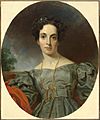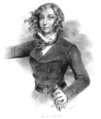1806 facts for kids
| Millennium: | 2nd millennium |
|---|---|
| Centuries: | 18th century – 19th century – 20th century |
| Decades: | 1770s 1780s 1790s – 1800s – 1810s 1820s 1830s |
| Years: | 1803 1804 1805 – 1806 – 1807 1808 1809 |
The year 1806 was an important time in history, especially in Europe. It was a period when Napoleon Bonaparte, the leader of France, was very powerful and changed the map of Europe. One of the biggest events of this year was the end of a very old and famous empire.
Contents
Major Events of 1806
The End of the Holy Roman Empire
On August 6, 1806, a very old empire called the Holy Roman Empire officially ended. This empire had existed for over a thousand years, since the time of Charlemagne. It was a group of many different states and kingdoms in Central Europe, mostly in what is now Germany.
Why the Empire Ended
The Holy Roman Empire ended because of Napoleon Bonaparte. After winning many battles, Napoleon created a new group of German states called the Confederation of the Rhine. These states were allied with France. The last Holy Roman Emperor, Francis II, realized his empire was losing its power and influence. To prevent Napoleon from taking his title, he decided to give up his crown and dissolve the empire. He then became Emperor of Austria instead. This event marked a big change in European politics and showed how powerful Napoleon had become.
French Troops Enter Berlin
Another significant event in 1806 was when French troops, led by Napoleon, marched into Berlin. This happened on October 27, after Napoleon's army defeated the Prussian army in the Battle of Jena–Auerstedt. Taking Berlin was a major victory for France and showed their control over a large part of Europe.
Important People of 1806
Many important people were alive in 1806, shaping the future in different ways. Some were leaders, while others were thinkers or artists.
- Isambard Kingdom Brunel: A brilliant English engineer who would later design famous ships, bridges, and railways.
- Emma Catherine Embury: An American writer who became known for her poetry and stories.
- J. V. Snellman: A Finnish philosopher and statesman who played a key role in Finland's national identity.
- John Stuart Mill: A very influential British philosopher and economist who wrote about freedom and logic.
- Max Stirner: A German philosopher who was an early thinker in the ideas of anarchism.
- Emilia Plater: A Polish-Lithuanian noblewoman and revolutionary who fought for independence.
- William Pitt the Younger: A British politician who served as Prime Minister of the United Kingdom. He was a key figure during the Napoleonic Wars.
- Charles-Augustin de Coulomb: A French physicist who made important discoveries about electricity and magnetism.
Images for kids
-
October 27: French troops enter Berlin.
See also
- 1806 para niños (1806 for kids in Spanish)
 | Valerie Thomas |
 | Frederick McKinley Jones |
 | George Edward Alcorn Jr. |
 | Thomas Mensah |











